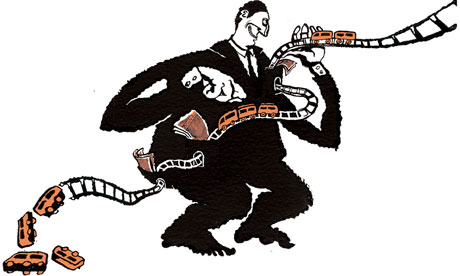Branson and FirstGroup have both gamed a disastrous privatisation. The case for public ownership is compelling

'Nearly 20 years after John Major’s disastrous privatisation, this is the reality of Britain’s railway: a byword for bewildering fragmentation, unreliability and exorbitant cost.' Illustration by Belle Mellor
Barely a month since the private security firm G4S crashed and burned in the runup to the London Olympics, we're back in outsourcing la-la land again. This time the battle is over the monopoly franchise to run passenger trains on Britain's most lucrative rail route, the west coast mainline.
Ministers have given the 15-year contract to the privatised bus operator FirstGroup, with a licence to increase fares by up to 11% a year, reduce services, downgrade catering and close ticket offices. Richard Branson, whose Virgin Trains has had the franchise since the 90s, is crying foul, and on Tuesday launched a legal action to halt the handover.
Labour wants MPs to be able to scrutinise the deal. But the transport secretary, Justine Greening, is determined to plough ahead regardless, potentially tying the hands of government for the next three parliaments. And the controversy follows uproar over plans for an average 6.2% rise in rail fares from January.
Commuters now routinely spend 15% of their income travelling to work on what is now the most expensive rail network in Europe. No wonder coalition MPs are lobbying for some relief from the drive to load more of the costs on to passengers: it is now cheaper to fly on half the popular routes around Britain than travel by more environmentally friendly rail.
The heavily subsidised rail privateers, whose top five executives paid themselves an average of £1m last year, are also supposed to cough up a bigger share. But there's little sign of that happening – and the west coast mainline deal helps explain why.
Forget the special pleading by Branson, who's made over £200m from rail privatisation. Virgin's own record is poor. But his accusation that FirstGroup is gaming the system is widely shared by industry analysts and insiders.
Greening claims FirstGroup offers the best deal for taxpayers. In reality it's based on heroic growth expectations of 10.6% a year and payments to government that are heavily loaded on to the contract's last few years. The company in fact has an incentive to dump the franchise as those payments come due, because they dwarf the cost of the bond penalty.
If FirstGroup – which is walking away from the Great Western franchise – defaults, it wouldn't be the first time. That's what happened with Bermuda-based Sea Containers and National Express, who had the contract for the east coast mainline before the last government was forced to take it over. But by then, both ministers and corporate executives would likely be long gone.
Nearly 20 years after John Major's disastrous privatisation, this is the reality of Britain's railway: a byword for bewildering fragmentation, unreliability and exorbitant cost – and a gigantic scam for siphoning off public money into the pockets of monopoly contractors.
Branson has raged at the government's "insanity" in awarding the west coast mainline franchise to FirstGroup. But it is the system itself that is irrational. Privatisation was supposed to cut public subsidy by boosting competition, investment and innovation.
In fact, it has done the opposite. Government funding has at least doubled in real terms, while fares have also increased, largely because of privatisation – including the costs of fragmentation and duplication; dividend payments to investors; contractors' profit margins; debt write-offs; and higher interest payments to keep Network Rail's debts off the government's balance sheet.
Taken together, those privatisation costs amount to around £1.2bn a year, according to a new thinktank report (Transport for Quality of Life's Rebuilding Rail), while genuine private investment is estimated at barely 1% of the total funding of the railway. It's hardly surprising that the mainly publicly owned rail systems in the rest of Europe – several of which now run bits of Britain's privatised rail – are cheaper.
The solution could not be more obvious. It's to rebuild a publicly owned and integrated railway. That can be done at zero or minimal cost, by bringing back each franchise into public ownership as the contracts expire. Freight apart, it can also be done under EU law, and with built-in local control. And saving the £1.2bn-a-year costs of privatisation over time would be the equivalent of an across-the-board cut in fares of 18%.
Rail renationalisation has long commanded large majorities in opinion polls. So you might imagine politicians would fall over themselves to sign up to a policy that's popular and saves money. The fact that they don't says something about the continuing grip of discredited ideology and corporate interests on Britain's political culture. Even a respected public transport pressure group like the Campaign for Better Transport, which now relies on funding from privatised transport companies, shies away from campaigning on the issue.
Labour is at last inching in the right direction. Its transport spokesperson Maria Eagle has floated the possibility of extending public ownership to rail services, and this week called for the east coast mainline to be kept in public hands. But with Tory defence secretary Phillip Hammond declaring the Olympics has changed his mind about privatisation and Liberal Democrat Vince Cable pressing the case for the outright nationalisation of banks, Ed Miliband can afford to be a bit braver. Last year he called for a break with the neoliberal model. Rail could be the place to start.




